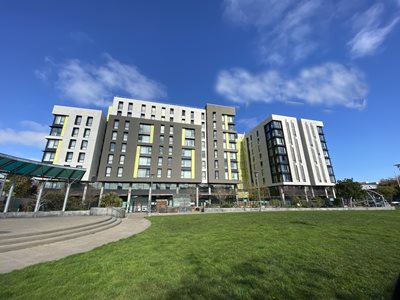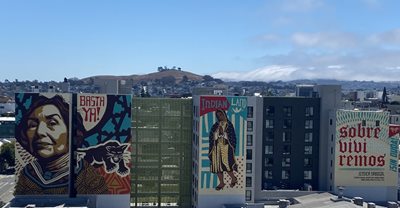For decades, the Mission District in San Francisco has been a hub for working-class Latino immigrants. As immigrants from other places arrived, too, the district maintained its Latino centricity with a supportive, vibrant ecosystem. Then, gentrification, arm in arm with the tech industry, began to change the neighborhood – both the people who could afford to live there and the businesses they frequented.
"It caused displacement of an ecosystem built on support," explains Christopher Gil, associate director of marketing and communications at Mission Economic Development Agency (MEDA).
MEDA has focused on building Latino prosperity, community ownership and civic power since 1973. The NeighborWorks network organization has also spent the last decade focusing on bringing back the people and their support system.
"As we start to turn the tide of displacement, we have to keep arts and culture and nonprofit, family-serving businesses alive," Gil explains. "Otherwise, what's the point of being in the district?"
At MEDA, they refer to this as "cultural placekeeping." The nonprofit has strategized to bring displaced arts organizations and other nonprofits back to its own real estate, while also maintaining a community meeting space and a microbusiness incubator where businesses can try to establish themselves before opening brick-and-mortar shops.

MEDA's strategy has included purchasing smaller buildings – four to 25 units. That includes the building where Beatriz Garduno made her home. When MEDA purchased the building through the city's Small Sites preservation program, it allowed her to stay, she says, and not be pushed out by rising rents like some of her nearby neighbors. MEDA also uses her cleaning services business as a way to directly support small businesses in their community.
Along with 1,400 rental households, MEDA tenants include nonprofits, businesses like Chely's Beauty Salon, restaurants like Cafe D 'Olla, arts groups like Galeria de La Raza, childcare providers and more.
"They were being evicted," says Feng. Rising rents had even forced HOMEY, Homies Organizing the Mission to Empower Youth – an organization that works with neighborhood youth – to leave the neighborhood, MEDA found room for them.
They also helped Chely's Beauty Salon with support during the pandemic, offering a loan and workshops as the business tried e-commerce to help make it through the time when customers were staying home. "MEDA's free support has been essential," say the salon's co-owners.
In addition to making the effort in their own buildings, MEDA approaches private landlords who are

Feng thinks of it as a web – a web they try to weave into all of the work they do, including education. MEDA has been sharing its model and best practices as part of a national effort to expand Latino prosperity and cultural placekeeping beyond the Mission. "All communities are trying to crack the code. How do we share what we've done supporting our communities?"
"MEDA is a powerful example of what we mean by comprehensive community development," says Sarah Parmenter, NeighborWorks America's director of Community Initiatives. "It is a holistic, intentional and relational approach to create equitable opportunities for people and place. And it is deeply rooted in community building and trust."

